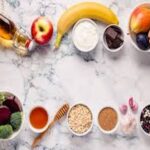India
healthysoch
New Delhi, December 04, 2020 :
Underlying obesity, diabetes, heart disease and hypertension predispose to severe COVID-19 disease. Poor oral health increases the risk of developing these conditions suggesting a link between poor oral health and severity of COVID-19 complications.4 Aspiration of oral secretions and their, alteration of the respiratory epithelium by periodontal-associated cytokines, and oral mucosal surfaces which promote adhesion of respiratory pathogens have been suggested as possible mechanisms via which oral pathogens can cause and worsen lung infections. 5,6 Good oral hygiene prevents spread of oral bacteria to other parts of the body, including the lungs.6 Interventions that improve oral hygiene have been shown to reduce risk of pneumonia. 7
Gargling is a common oral hygiene practice. Antiseptic mouthwashes/gargles reduce oral biofilm formation thereby decreasing the oral microbial load and in turn preventing development of complications.
Gargling with an oral antiseptic such as povidone-iodine (PVP-I) improves oral hygiene. The advantages of PVP‐I are its universal spectrum of antimicrobial activity (covering Gram-positive and Gram-negative bacteria, viruses, fungi, protozoa, and bacterial spores), faster onset of action, more persistent effect and low potential for resistance. 4,8,9 It is also safe.10 PVP-I has rapid virucidal activity against SARS-CoV-211,12 and significantly reduces viral load in the oral cavity and the oropharynx. 13
In an article published in the British Dental Journal, Sampson et al have written, “Good oral hygiene has been recognized as a means to prevent airway infections in patients, especially in those over the age of 70”…. “oral hygiene be maintained, if not improved, during a SARS-CoV-2 infection in order to reduce the bacterial load in the mouth and the potential risk of bacterial superinfection.” 2
Masking, hand hygiene and physical distancing are recommended as protective measures. To these can be added, PVP-I gargles, which not only decrease replication of SARS-CoV-2 in the throat and prevent spread of infection, they also improve oral hygiene and prevent complications such as pneumonia in patients with COVID-19, thereby reducing morbidity and mortality. This is particularly important for patients who have underlying disease conditions.
References
- Cox M J, et al. Co-infections: potentially lethal and unexplored in COVID-19. Lancet 2020; DOI: 10.1016/S2666-5247(20)30009-4
- Sampson V, et al. Could there be a link between oral hygiene and the severity of SARS-CoV-2 infections? Br Dent J. 2020;228(12):971-5.
- Zheng M, et al. Functional exhaustion of antiviral lymphocytes in COVID-19 patients. Cell Mol Immunol 2020;17:533-5.
- Botros N, et al. Is there an association between oral health and severity of COVID-19 complications? Biomed J. 2020 Aug;43(4):325-7.
- Yoneyama T, et al. Oral care reduces pneumonia in older patients in nursing homes. J Am Geriatr Soc. 2002;50(3):430-3.
- Patel J, et al. The role of oral bacteria in COVID-19. Lancet Microbe. 2020;1(3):e105.
- Manger D, et al. Evidence summary: the relationship between oral health and pulmonary disease. Br Dent J. 2017;222:527-33.
- Lachapelle JM, et al. Antiseptics in the era of bacterial resistance: a focus on povidone iodine. Clin Pract 2013;10:579–92.
- Kanagalingam J, et al. Practical use of povidone-iodine antiseptic in the maintenance of oral health and in the prevention and treatment of common oropharyngeal infections. Int J Clin Pract. 2015;69(11):1247-56.
- Vergara-Buenaventura A, et al. Use of mouthwashes against COVID-19 in dentistry. Br J Oral Maxillofac Surg. 2020;58(8):924-7.
- Anderson DE, et al. Povidone-iodine demonstrates rapid in vitro virucidal activity against SARS-CoV-2, the virus causing COVID-19 disease. Infect Dis Ther. 2020:1–7.
- Hassandarvish P, et al. Povidone iodine gargle and mouthwash. Br Dent J. 2020;228(12):900.
- Eggers M. infectious disease management and control with povidone iodine. Infect Dis Ther. 2019;8(4):581-593.
Author : Dr KK Aggarwal, President CMAAO, HCFI and Past National President IMA







